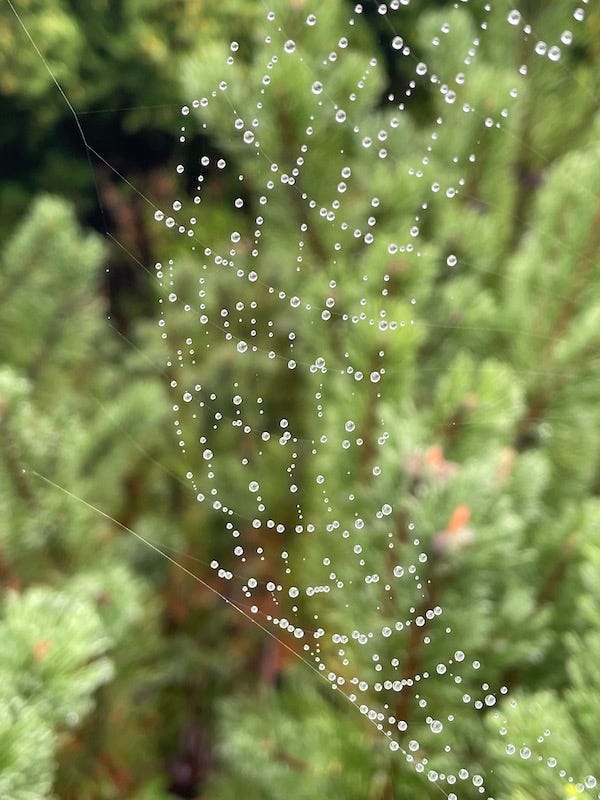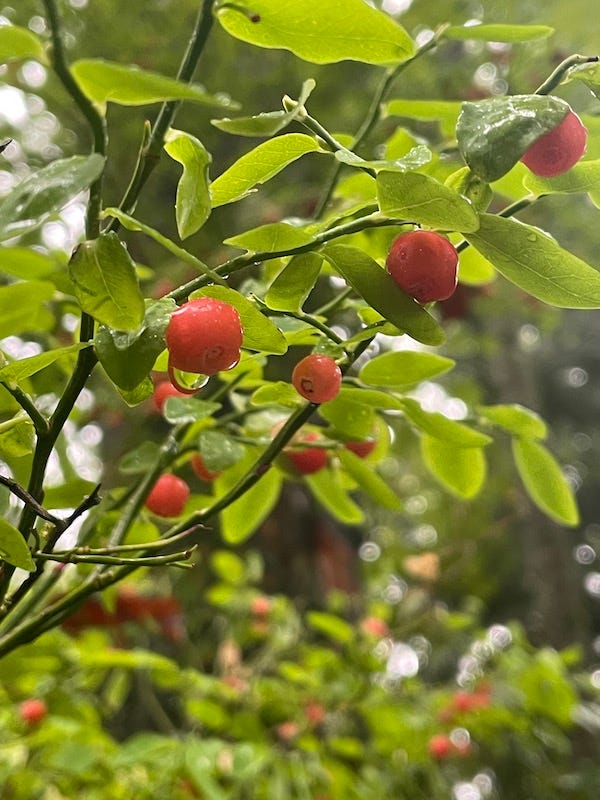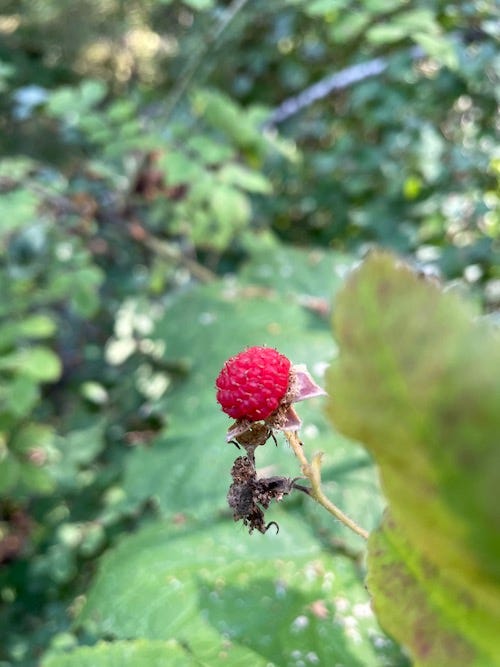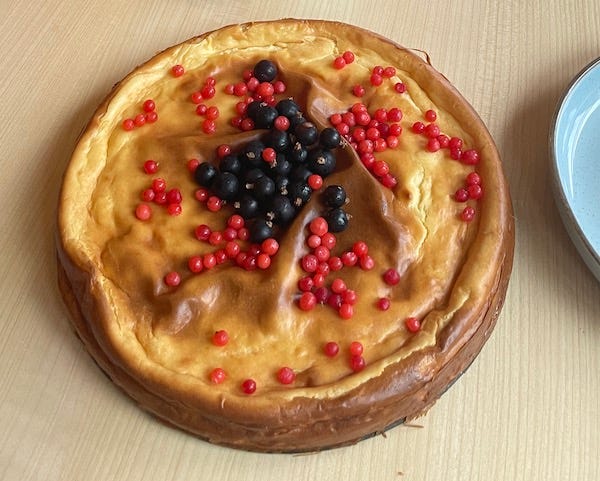August
And a recipe for cheesecake
June annoys me as summer charges in with its endless sun, heat, and the promise of more to come. By August, July has worn me down, but this eighth month with its ragged edges brings me a little more energy. It is still hot, yes, but the days are slowly getting shorter. Though it hasn’t happened yet, this is the month when I anticipate that first breeze cradling the infancy of fall in its air. In my regular life, not this year, the garden is beginning to produce. Abundance means preservation, which is an incredible amount of work (that can be steamy hot and long grueling hours) gives me energy. Is it the fresh tomatoes at every meal or the satisfaction of “putting by” that brings me back from my wilted slump? I don’t know.
I also don’t remember exactly when my unfavorable opinion of high summer developed--this season and I have had a tenuous relationship for some time. We moved to Arizona when I was 12. It might have been then. It was a dry heat, I was told, so not as hot. I think I rolled my eyes. Summer was a lot of things. My grandmother visiting, splashing in Beaver Creek or Clear Creek swimming holes, eating ice cream for dinner, it was also sitting by the side of a road feeling the heat radiate from its surface while we waited for our overheated car to cool down.
My family drove old cars and adventures were often delayed when steam started billowing out of the front hood. The car would be pulled over and its hood lifted. Boiling water would sputter out of the radiator cap. We would watch and wait. On the Interstate, other cars sped past, while I tried to shrink out of view. Other times our car died on remote dirt roads that snaked through the desert to secluded hiking spots. I imagined my parched demise (insert whistling Western music and vultures circling in a clear vast blue sky) as we sat in the thin shade of a mesquite bush.
I thought I left that kind of heat behind when I moved back to the Pacific Northwest after college, but in the last few years, this dry desert-like weather has also moved north and west. Unlike landlocked Arizona, our home is only 50 air miles away from the Pacific Coast. The coastal rain doesn’t always make it this far.
I squint and shy away from hot sunny days. Tending and gardening happen early and late, under rising and receding light. I retreat under emerald canopies of tree shade. I am happy to bask in the dappled, leftover light that the tree did not catch. I love knowing that the tree will turn the sunlight into the sugar that powers life.
A conifer forest, oh mercy me, the smell of sunbaked duff mixed with pine and fir terpenes wafting from needle and bark is a flavor I taste through my skin. It is a comfort deep in the marrow of my bones that has been with me before memory. I was a little girl who was brought up on Grimm’s tales. I was terrified of the big bad wolf, all things lurking around the corner, and probably my own shadow. Even so, a conifer forest responding to the warmth of the sun made me suspect these places under the cover of trees couldn’t be bad.
The forest behind our home is primarily Ponderosa Pines and Douglas Firs. When it is dry an earthy vanilla and clean citrus combine with the smell of friction on wood, near combustion but not fire and smoke, like rubbing two sticks together or sawing with a blade that isn’t sharp enough.
For nearly a month I have been in Bellingham, Washington. The woodland that edges one side of my son’s family’s home is part of a city green belt. It is a slice of the Pacific Northwest rainforest. A deep breath fills my lungs with crushed green and sugar. Here and there a hint of ocean comes in with the breeze. I love the ease of summer here and feel like I am cheating it. There are no jagged edges as moss and lichen drapes, wraps, or hangs where it can. Boulders are cushioned in green and there are few bare spots on the ground as ferns and a myriad of understory bushes and vines fill the spaces, both horizontal and vertical, spilling over themselves and each other.
All this lushness is punctuated by small berries—mostly rosy huckleberries and bright red thimbleberries. The abundant deep purple Oregon grapes and near black salal berries withdraw behind and under leaves. What I don’t understand is why isn’t anyone, besides me and my two-year-old granddaughter, picking them? For her, they are a delicious treasure hunt and motivation to keep walking down the path. For me, thimbleberries are August, a perfect result of sun, water, and plant. Thimbleberries are the embodiment of the sweet fleeting fragility of all of it—the moment or a lifetime.
For me, thimbleberries will never become more than what they are an ephemeral sweetness on the tongue. So delicate that they cannot be picked without some damage—red-stained flavor immediately dripping on thumb and forefinger, followed by immediate deterioration if not eaten then. If I had to compare, a thimbleberry could be a sublime raspberry, softer, fresher somehow, perfect tart with a hint of floral or honeyed sweetness. I can’t imagine them cooked in pastries or preserves because it seems so much would be lost in the heating, and besides in my experience, an abundant thimbleberry patch wouldn’t yield much more than a handful.
It was my son’s birthday, the day before his new daughter’s BIRTHday, and we picked enough tiny red huckleberries to put on the cheesecake I made for him. My grandmother’s recipe and the only thing I claim to bake. My family knows to go to other members for sugary treats.
I have been working on this post for well over a week. This first week of August has also been extra special for our family. My two-year-old berry-picking buddy’s baby sister was born. I am both on the periphery (I get to sleep, mostly, through the night) and in the middle of this sacred time. The weeks when a young family grows—meeting the newest wee member and their constellation changes forever. I am reminded how all-consuming each day is. How life slows down to a minute-by-minute pulse. How the days are quite full and busy, yet nothing defined as adult goals are accomplished. How tender it is to witness a toddler meet her sister. The toddler whose emotions are up and down like a yo-yo as she navigates her understanding of this new world order. How amazing it is to hold a wee lass and get lost in her newborn gaze. Or to watch all the variations of human expression pass across her face in less than a minute. To wonder at her dreaming, eyes moving rapidly under her lids and again all the expressions. A newborn dream feels as mysterious as what lies beyond the stars. How indulgent it feels to just keep one’s cheek on the warm velvet of a brand-new human’s tiny head. I think we are wired for this awe.
Time can stand still or melt away, choose your cliché, when just sitting with a newborn. To be clear a newborn who is fairly content and doesn’t want to nurse. Though I do love the rooting kisses that land on my cheeks and chin. This little one is still at the age when we would rather hold her while she naps. All of these feelings are something I remember from my own days of early motherhood but I know I wasn’t settled in myself and couldn’t ignore the list of demands I thought my job as a parent entailed to allow hours to go by in time my mind deemed unproductive--laundry, cooking, cleaning, and, and, and. That part is easy, there is nothing more important ultimately, than taking time with a small human. What I do feel tugging at my brain though is in a way scarier. The habit, desire, or need, to pick up my phone will bounce into my body craving that dopamine hit I suspect. I find it frustrating that a screen can and will pull me away from all that is wonderful, fleeting, and right in front of me. It takes conscious effort to not just check in—did Christopher text? Another one of my children? Smoke level at home? Here? Email? And before you know it time has disappeared…I don’t have to explain this to you. You know.
I have tried in those irksome moments this week to pick up a book instead. Something I used to do. I found The Peregrine by AJ Baker on my son’s end table. I am surprised I haven’t come across it before—it was written the year I was born. This alone is a draw of late. I am attracted to trying to piece together some kind of picture of what the world I came into was like. I am fascinated by how Mr. Baker is telling us about the landscape, birds and peregrines of his place because he sees the writing on the wall—they will be gone if chemical farming continues. This could be words written now. In the early pages, I almost laughed out loud at the irony of my turning to a book to avoid a screen and that the book is written by someone who had time to spend 10 years observing birds. We all could have this time, right?
I would love to hear your thoughts on screen time, The Peregrine, preservation as a meditation, August, or cheesecake.
Thanks for taking this journey with me.
My Grandma’s Cheesecake
(This is her original recipe which I changed ever so slightly as a Miso Cheesecake with a Miso Dulce de Leche topping Miso, Tempeh, Natto and other Tasty Ferments.)
4 eggs, room temperature
1 1⁄2 cups (300 g) sugar
2 teaspoons (5 g) arrowroot powder
2 teaspoons (8.4 g) vanilla extract
3 (8-ounce) packages (680 g) cream cheese, at room temperature
1 1⁄2 cups (360 g) sour cream
Preheat the oven to 325°F/170°C. Lightly butter a 10-inch springform pan.
Crack the eggs into a large bowl and beat until somewhat thick and lemon-colored, about 3 minutes. Add the sugar, arrowroot, and vanilla, and beat until well combined.
Place the cream cheese in another large bowl and beat until smooth. Gradually add the egg mixture, stirring well to combine.
Fold in the sour cream.
Pour the batter into the spring form pan and bake for 1 hour, or until the sides have puffed up. Turn off the oven, open the door a crack (inserting a butter knife between the door and the oven works great), and let rest in the oven for 1 hour.
Remove the cake from the oven and let cool at room temperature for 1 hour. Then remove the outer ring and refrigerate for at least 4 hours before serving.







I loved reading this. The Pacific Northwest is such a special place and you’ve brought it to life so vividly. Will keep an eye out for thimbleberries if I ever have the opportunity to forage them!
I moved from the Pacific Northwest (Bainbridge Island, Washington) to the countryside in northern Slovenia and while I am in awe of nature here, I have to admit there is nothing like summer in the PNW. There is also nothing like a newborn. Beautiful read. Thank you for sharing. August excites me too - somehow it means the pressure is about to be off, even when it’s at its highest. And I know rest is near and some solitude. And a crackling fire.